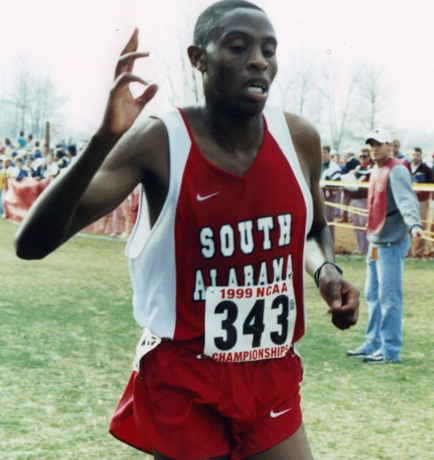
Lasy week Jeny and I celebrated 63 years of marriage. I am very thankful for her companionship and love. We are very proud of our family that has grown from our union.

New look at an old story. Over the years many people and events have influenced me. Most of the time, numerous interactions with the same people have left indelible marks on my life. Other times a solitary event and one person have had an enduring effect on my life. One day with David Kimani had a lasting effect.
The fall of 1999, David Kimani left Nairobi Kenya and arrived on the campus of the University of South Alabama. He landed a few days after school began. He quickly recovered the academic work he missed and started his daily routine of running eight miles before classes. His morning run was in addition to the afternoon workout with the track and cross-country team.
He left Nairobi, Kenya with a small satchel and a dopp kit. The airline misplaced his satchel for a week. Undaunted, he attended class and ran with a broad, infectious smile. He had fresh, happy eyes to go with his broad smile.
Our paths did not cross until later that fall. However, I frequently saw him during his morning run. His stride and demeanor were always relaxed. A tall, lean young man; he looked like a runner.
On November 22, 1999, in Bloomington, Indiana David won the NCAA Division I Cross-Country Championship as a freshman. The victory was the first NCAA championship for the University of South Alabama, a watershed event for our young university.
Our paths crossed three days later. On Thanksgiving Day, November 25, I had two experiences involving David that left indelible marks on my heart. The experiences were because of our mutual relationship with Stuart Muirhead.
Stuart came to South Alabama on a soccer scholarship. When Men’s Soccer was discontinued, he was awarded a track scholarship. He ran the 800 meters.
Stuart was a psychology major who took five courses from me. I knew him well. He was from Durbin, South Africa. I assumed he would not be going home for Thanksgiving. I invited him to join my family for Thanksgiving dinner. He asked if it would be okay to bring two other members of the track team who were also from Africa. I assured him they would be welcome.
Stuart arrived with David and a second runner, also from Kenya. Our family welcomed them and we had an enjoyable Thanksgiving.
During our conversation I learned neither of the Kenyans had ever driven a car. We lived in a rural area. Our house was the end of a cul-de-sac. We had practically no traffic. I offered both Kenyans the opportunity to drive the mile from our house to a corner and back. Without hesitation, they took the opportunity.
As the day progressed, I asked David the questions I regularly asked international students. What has been the most difficult experience during your time in the United States? What has been your best experience?
David’s answered the latter question with a big smile and three words. “Driving your car.”
The words humbled me. Three days earlier he won a national championship, but driving the car was his best experience. I had been driving since I was 13 years old. I owned my own car when I was 16.
His response made me reflect on the many privileges I have had during my lifetime. Privileges that I often take for granted. The incident was neither the first time nor the last time I have been humbled to realize my vast privileges but the juxtaposition to winning a national championship was a formative event and lasting memory.
My second indelible experience involved the cultures of the three students. Stuart was a white from South Africa. Apartheid was the policy in South Africa while Stuart was maturing. The two runners from Kenya were both Black.
I have asked many people to give their honest predictions about the personal relationships between two Kenyans and a white South African. The overwhelming majority offer racism as their reason for assuming there would be tension between the Black Kenyans and the white South African. No one suggested difficulties between the two Kenyans. Most people assume there would be difficulties between the white South African and the two Blacks because of apartheid.
At one point in the evening when Stu and I were alone, he asked me if I noticed anything about how the two Blacks related to each other. He said they got along on the surface because they were both Kenyans in a foreign country and teammates. However, they were wary of each other. The underlying tension hindered closeness. The tension was because they were from separate tribes, very different cultures.
David and Stuart were very close. Although Stuart was raised under apartheid, he was comfortable around blacks. He spoke Zulu. David was comfortable around whites.
The second experience made me explore the problem of prejudice about tribal culture. I was ignorant of the extent of the problem of tribal prejudice in Africa. Conflicts between Zulu and Xhosa, Hutu and Tutsi, and other tribes have led to thousands of deaths in my lifetime.
When I reflected on the experience, I began to broadened my understanding of prejudice. I realized the extensive power of prejudice beyond racial and gender prejudice.
Many factors have different roles in the wide variety of group conflicts. Colonialism and economic conditions are just two. Whatever the factors have been, they have led to group prejudice and deadly consequences. I appreciate that my experience with David broadened my understanding of the importance of group prejudice.
Unfortunately, I did not have another Thanksgiving with David because the coach who recruited David was hired by the University of Alabama. David followed him to Alabama and had an outstanding career. At any point in his college career, he could have signed a professional contract and made enough money to move his family out of poverty.
A testament to David’s outstanding character was his determination to stay in school. He wanted to earn a college degree as an example for the children in the poverty-stricken community in which he was raised. He assumed, as we all did, he would have several years to earn money after graduation.
The week before graduation, he had an agent, a six-figure guaranteed contract and was ready to graduate. At lunch, he filled his tray at the university cafeteria. When he turned to go to his table, he collapsed and died.
David Kimani passes away at 25
Autopsies were unable to establish the exact cause. Unfortunately, the death of fit runners happens more often than I realized.
Our daughter was killed in a tragic accident. Our friends held an annual golf tournament in her honor. Stuart suggested we add a run to honor David.
His parents attended the event. The fraternity of those who have lost a child has a terrible initiation fee. They were of course devastated by the loss of their son and the opportunity to get out of poverty. His youth, plus his dream of a college degree, deepened my appreciation for their loss and my esteem for David. I did not have words but they were buoyed by our shared experience and the presence of those who thought so highly of their son.
One day, with one extraordinary young man created memories and lessons I will not forget. One about humility the other about tribal conflicts.
Today, I am concerned about the latter in the United States. The possibility of tribal warfare is not just what “other people” do. Please think about it seriously —
Conflicts berween
Protestants and Catholics in Northern Ireland
Yankees and Confederates
Gangs in America
Apache the Comanche and other Native American tribes
Sunni and Shiites in the middle East
Christians and Jews
Jews and Muslims,
Hindus and Muslims
Muslims and Christians
Hutu the Tutsi and other tribes in Africa
Tribes in Papua, New Guinea
and many, many other groups have occurred in history (several within my lifetime),
then violent conflict could happen between Democrats and Republicans.
Please, let us do what we can to promote civil discourse and cooperation in our country.
This and That
Tall Tale. At the Pennsylvania Energy and Innovation Summit President Trump claimed that his uncle, a MIT professor at the Massachusetts Institute of Technology, had taught Ted Kaczynski, better known as the Unabomber. Trump recounted a conversation with his uncle about Kaczynski.
The problem is Kaczynski didn’t go to MIT, he studied a different discipline, and Trump’s uncle John died more than a decade before Kaczynski became famous, so Trump and his uncle could not have discussed him as a student or the Unabomber.
I did not support Biden because of his age and cognitive decline. If I am being honest with myself, I cannot just ignore or excuse this incident.
Good News
Kindness
Couple Turns Old Dorm Into Safe Home For Older Women Facing Homelessness
Homeless Hero Saves 6-Year-Old From Oncoming Traffic
Minnesota Pizza Shop’s Dumpster Discovery Inspires Wave Of Kindness
Peace
Jerry
0 Comments